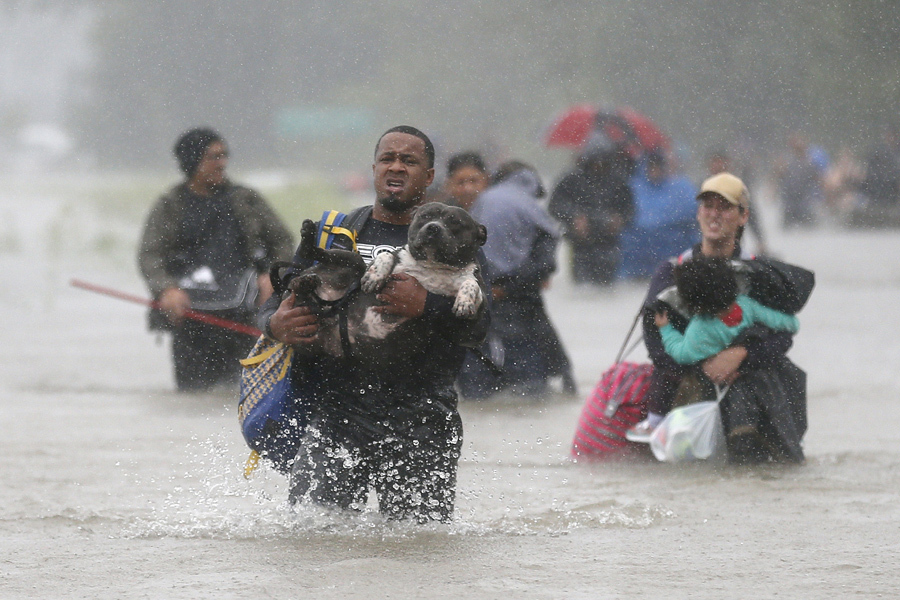 As flooding from Hurricane Harvey continues to rise and spread, officials are warning thousands of Texans to avoid the water.
As flooding from Hurricane Harvey continues to rise and spread, officials are warning thousands of Texans to avoid the water.
Floodwaters act as sponges for hazards. As they bubble past city streets and inundate cars and homes, they collect sharp objects, sweep up insects and wildlife, and gather human waste.
But staying out of the water is easier said than done.
Just before she was rescued at around 4 a.m. on Sunday from Harvey, 17-year-old Maya Wadler watched as brownish-gray floodwaters “bubbled up from the doors, seeped in from the windows,” she told The New York Times.
Chris Van Deusen, a spokesman for the Texas Department of State Health Services, told NPRthat although his group was advising people to avoid floodwaters, “of course, people have had to be in the water — they haven’t had a choice.”
The Environmental Protection Agency warns that floodwaters can pull in raw sewage as well as industrial chemicals and solvents. It urges anyone exposed to frequently wash their hands and ensure children don’t play in it.
“Floodwater mixes with everything below it,” Richard Bradley, the chief of emergency medical services and disaster medicine at the University of Texas’ McGovern Medical School, told Time. “If it covers a field with pesticides, it picks up the pesticides. It can also carry animal waste from fields and forests.”
Rachel Noble, a professor of marine biology at the University of North Carolina at Chapel Hill, sees two major risks with floodwater. The first is that failing, flooded infrastructure can increase the chances that people come into contact with dangerous bacteria from sewage and other sources. One such concern is tetanus, an infection caused by bacteria in soil, dust, and manure that can enter the body via a cut or puncture wound. When the bacteria enter the body, they produce a poison that causes painful muscle contractions. These can cause a person’s neck and jaw muscles to lock, hence the other name for tetanus: lockjaw.
The Centers for Disease Control and Prevention typically recommends adults get a tetanus booster shot every 10 years. Because of Harvey, Texas health officials are urging people to make sure they’ve had theirs, NPR reported. They are also sending supplies of the vaccine to the affected areas.
 Skin lesions caused by Vibrio vulnificus bacteria after Hurricane Katrina.
Skin lesions caused by Vibrio vulnificus bacteria after Hurricane Katrina.
The second type of risk, according to Noble, is that ocean waters are being introduced to urban areas, so marine bacteria that naturally thrive in the sea are suddenly posing unforeseen risks to people. A major issue in this arena is Vibrio. Unlike the bacteria that cause tetanus, Vibrio bacteria are naturally-occurring marine microbes that can pose a rare but potentially deadly risk. In the wake of Hurricane Katrina, five people died and 22 lost limbs as a result of Vibrio infections.
Overall, infections from both types of bacteria pose a significant threat to people near Harvey floodwaters.
“The bacterial count in floodwater is extremely high,” Bradley told Time. “The chance of getting a skin infection is really quite serious.”
As far as Vibrio is concerned, Noble said that anyone in direct contact with floodwater and who is experiencing infection-like symptoms should be keeping a close eye on themselves. She advises paying close attention to any open wounds and looking out for those that get “hot and angry,” or red and raised. Symptoms like fever and chills can also be a warning sign for Vibrio infection, she said.
Yet another risk in flooded areas is wildlife, as snakes, insects, and other wild animals can be drawn to the water or swept up in it.
“Storm activity definitely increases the potential for snakebite as the snakes get flooded out and seek higher ground,” Bryan Fry, an expert on venomous snakes at the University of Queensland in Australia, told The Washington Post.
These dangers don’t necessarily subside once the storm ends, since stagnant water poses risks of its own. Wet environments in houses and buildings are ideal for mold. In the wake of Hurricane Katrina in 2005, close to half of all inspected homes had visible mold, according to the CDC. Mosquitoes and other pests are also attracted to still water.
Regardless of where you are, the ways to keep yourself safe are the same: ensure you’ve gotten your vaccinations, wash your hands frequently, and let your doctor know if you have any cuts or open wounds that have come into contact with potentially dangerous water.
Source:
Source Article from https://worldtruth.tv/health-officials-are-warning-texans-to-stay-out-of-harvey-floodwaters-for-a-disturbing-reason/
Related posts:
Views: 0
 RSS Feed
RSS Feed

















 September 1st, 2017
September 1st, 2017  Awake Goy
Awake Goy  Posted in
Posted in  Tags:
Tags: 
















